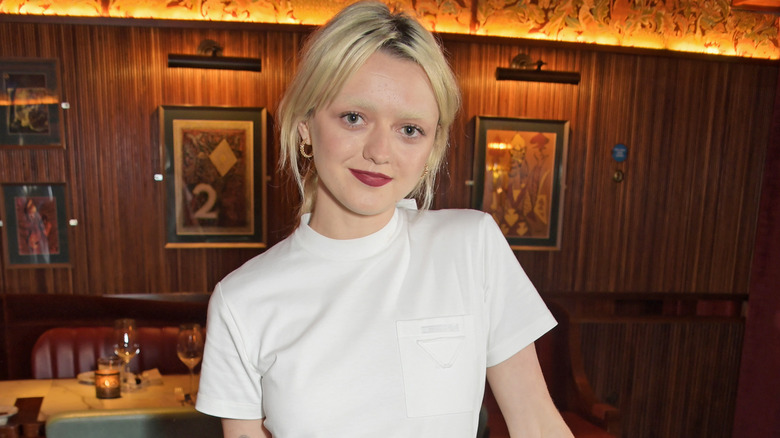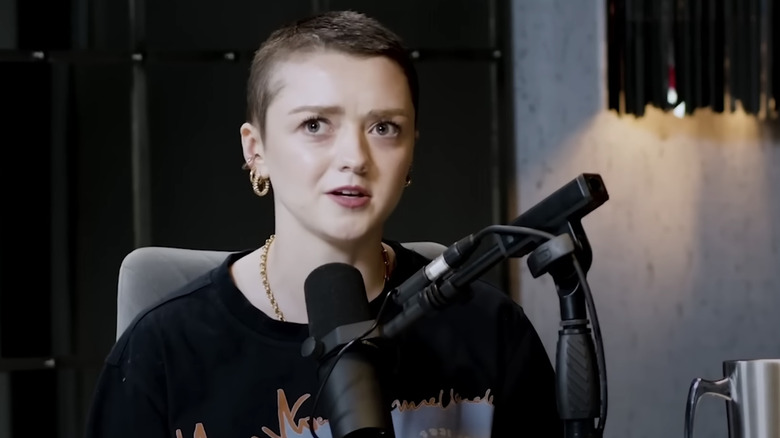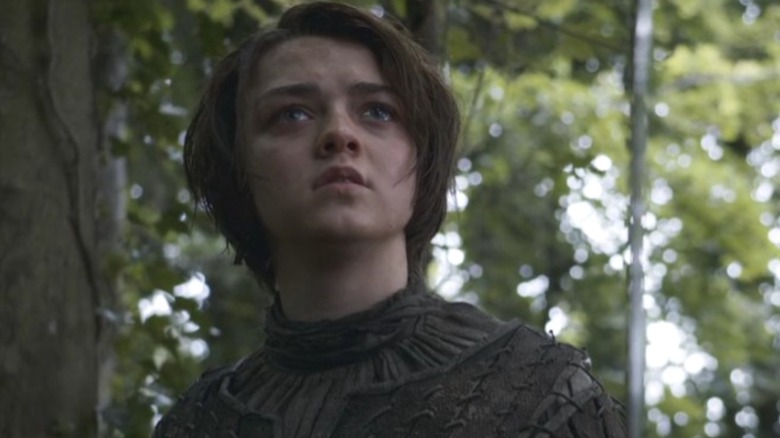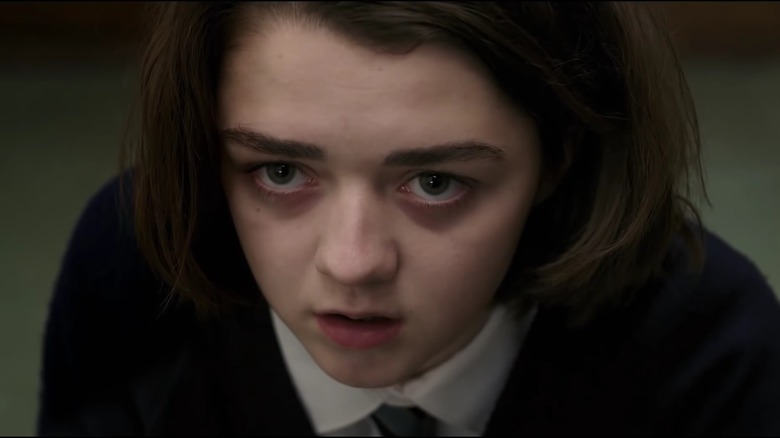Tragic Details About Maisie Williams
When she was cast in "Game of Thrones" as the fearless Arya Stark, Maisie Williams became incredibly famous at an incredibly young age. She found fame difficult to deal with, telling Entertainment Weekly that she often found herself the target of trolls online. "It's hard. It's like a minefield in this industry, and it's hard to know what to say and how to word things," she said. "There isn't a guide to doing it right."
While the world watched Williams grow up in the public eye, many fans may not have known just how difficult the star's life was behind the scenes of the HBO fantasy epic. For a time, Williams wasn't even sure she wanted to continue acting, because her fame had become so overwhelming. "It got to the point where I'd be in a conversation with my friends and my mind would be running and running and running and thinking about all the stupid things I've said in my life," she told the podcast "Happy Place" (via Global News). "This is why people go insane; I get it now."
From traumatic family problems to experimenting with substance use, from bullying at school to the way that playing Arya Stark negatively affected her relationship with her own body, these are tragic details about Maisie Williams.
Her mother left the family when Maisie Williams was young
Maisie Williams has had a complicated relationship with her parents, starting with the fact that her mother left the family early, walking out on her father when Williams was only four months old. However, she remained part of Williams' life. "I grew up between Shirehampton and the outskirts of Bristol — my mom and dad were separated so I spent time with both of them growing up," she told Time.
While Williams now describes her mother leaving as an "escape" from her father, her early years were full of resentment. Nowadays, though, Williams has come to appreciate her mother. "Happy Father's Day to my mother who played both roles for me growing up," she tweeted in 2015. And in 2016, Williams brought her mother as her date to the Emmys. She revealed to People that her mother was a breast cancer survivor, making her an inspiration for this part of Williams' life. "She has survived many, many times ... survived relationships, survived breast cancer and constantly is just trying to do more to help other people," she gushed.
When Williams and her mother talk about those early years, they find the experience still affects them. "It's like, incredibly painful," Williams told "The Diary of a CEO" podcast. "I think there's so much pain ... It's like, very painful to think about like, people that you love like, being in pain as well."
Her father tried to pit her against her mom
Though Maisie Williams would spend much of her childhood caught between her parents, she spent the early part of her life mostly with her father. On the "The Diary of a CEO" podcast, she revealed that she was mistreated, calling the experience "traumatic." Without going into too much detail, explaining that the experience still affects her family, Williams spoke about how her trauma manifested in several different ways. "Ever since I can remember, like, I've really struggled sleeping," she said. "A lot of the traumatic things that were happening, I didn't realize that they were wrong." One day, noticing that Williams seemed unwell, a teacher asked if she'd eaten breakfast. Learning she had not, the teacher pressed for more details. "I said, 'We just didn't have any breakfast,'" Williams recalled, eventually admitting that she often wasn't fed before school.
As a result, her mother picked her up, and they finally spoke about what was going on when Williams stayed with her father. "I still wanted to fight, and say, 'No!' Like, 'These things aren't bad!'" she said. "Like, 'You're trying to take me away from my dad, and that's wrong!'" Eventually, Williams came to realize that she had been manipulated by her father into distrusting her mother. "I was like, indoctrinated in a way," she said. "I was in a child cult against my mother."
Maisie Williams no longer speaks with her father
Because of everything she went through as a child, Maisie Williams no longer speaks with her father. She told "The Diary of a CEO" that when she finally reconciled with her mother and realized that she had been manipulated. "I thought, 'Oh my god, I'm so glad I don't have to see my dad anymore.'" Still, she struggled with that decision thanks to years of being conditioned. "It still was like against everything that I had ever, ever knew to be true," she reflected.
As a result, Williams has had to figure out how she feels about her dad. Ultimately, she decided to take a step back and look at the situation objectively, wondering how she'd feel if she weren't his daughter and he was just someone who treated her this way. "Then, I just kind of, could separate myself from it a little bit," she said. "And I could start to sort of reflect on him as a person ... What happens that you get so stuck in your mind, that you can just like, you know, permanently like mistreat people ... children. Like, your own children."
Williams found herself wondering how her father had been treated growing up, pondering whether his own upbringing made him that way. Allowing that this may not be an excuse, Williams concluded, "It is sort of like, a nicer way to think of him than, you know, as like, someone who doesn't love me."
Playing Arya Stark affected her relationship with her body
Maisie Williams played Arya Stark on "Game of Thrones" between 2011 and 2019, aging nearly a decade while performing as a character who lived through about six or seven years of story. In addition to keeping Williams looking young, Arya also spends a long while disguised as a boy. This meant Williams needed to change and conceal her body right as she was growing up, and that wound up affecting her more than she expected. "When I started becoming a woman, I resented Arya because I couldn't express who I was becoming. And then I also resented my body, because it wasn't aligned with the piece of me that the world celebrated," Williams told GQ.
More specifically, Williams resented her feminine figure, which had to be hidden to play Arya. She explained her process for getting into character to Vogue, recalling that they cut her hair short and contoured her nose to look wider than it was. "They'd also put this, like, strap across my chest to like, flatten any like, growth that had started," she said. "That just felt horrible ... I felt kind of a bit ashamed for a while."
It's only now that the show has ended that Williams has been able to embrace her natural figure. "It is nice to like, look more feminine, and have a real waistline," she concluded.
Her fame became a burden at school
You might expect the star of the most successful show on television to be popular at school, but Maisie Williams found that her fame set her apart. Though she had friends, Williams found that many of the other students distrusted her. "Me and my best friend, the two of us are just segregated from the rest of our school," Williams told Buzzfeed in 2014. "They will tell you it's because I'm stuck up and I'm above myself and I'm too good for their friendship, but it's just because they never gave me a chance to be part of that at all."
Ultimately, Williams decided to leave school and attend college at 16. Still, at college, Williams also struggled to fit in because her performing arts classmates thought she was already famous enough. "If I were to be like, 'I don't need to go to college anymore because I have made it in the acting business,' my college friends would be like, 'Oh my god. She's such a b****,'" Williams insisted. "You can't win. You just can't win."
In an interview with The Guardian, Williams said the bullying had lasting effects. "Having this awful experience made me really bitter about life and people," she said. "People let you down and they hurt you."
Her early fame took a toll on her mental health
"Game of Thrones" premiered in 2011 and lasted for most of the decade, paralleling the rise of social media. That made it difficult for Maisie Williams to become famous at a young age, especially considering the criticism she read online. "It got to me a lot," she said on the "Happy Place" podcast, noting that she's still affected by what she sees on the internet. "There's just a constant feed in your back pocket of what people think of you," she said. Williams acknowledged that people online don't expect the person they're writing about will ever read what they've written, but that's not always the case. "They do [see it]," she said. "And it will affect them for a really long time."
As a result, Williams said she has struggled with her mental health. "It gets to a point where you're almost like, craving something negative, so that you can sit in a hole of like, sadness," she said. "It's really bizarre the way that it starts to consume you." Eventually, Williams confessed, "I'd tell myself every day that I hated myself."
In addition to her feelings of sadness, Williams has also opened up about her experience with anxiety. In a video for the Dare to Share campaign with Child Mind Institute, Williams revealed, "I got to a point where I was too anxious to go to school." She asked for help, and thankfully the adults around her were supportive.
Maisie Williams experimented with substance use
As a child star, Maisie Williams had to deal with the expectations people have of children who enter entertainment early. She told the Independent she often felt like people were expecting a downfall, without even explaining to her what leads other kids to struggle. "Even when I was 12, people were like, 'Ooh, are you gonna get a drug habit and ruin your life?'" she recalled.
Williams did, eventually, begin experimenting with substance use. Things got particularly serious after a bad breakup, as she revealed on the "School of Greatness" podcast. Describing a dark period that she says lasted several months, Williams reflected, "I was dead set on being very self-destructive ... never really had a good relationship with substances anyway, and it had all sort of started to come out."
On the "The Diary of a CEO" podcast, Williams opened up further on the topic. "I don't want to undermine it," she said. "I took a lot of party drugs, and like, partied. ... I was in a position where, like, I could buy more." Thankfully, Williams felt that she was eventually able to stop when she wanted to. "It was like, definitely something that I was like ... I need to stop doing this if I want to feel happiness," she explained. Nowadays, Williams doesn't consider herself sober, but she doesn't drink very often. "I don't really drink like, in the house, or on weeknights," she reflected, instead limiting herself to drinking socially.
If you or anyone you know needs help with addiction issues, help is available. Visit the Substance Abuse and Mental Health Services Administration website or contact SAMHSA's National Helpline at 1-800-662-HELP (4357).







